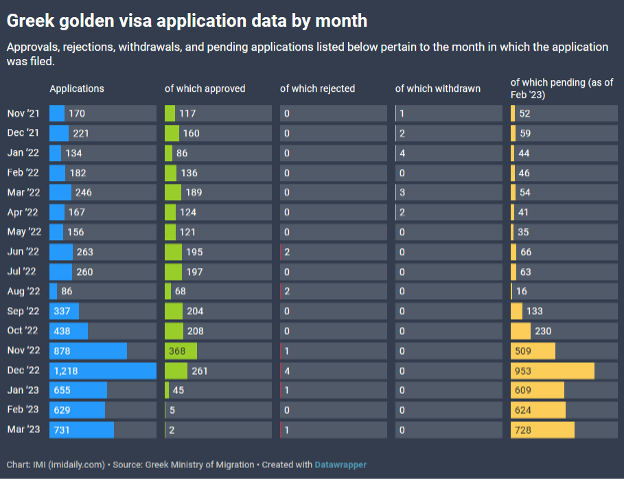Ireland and Portugal Are Scrapping Their Programs… But Greece Is Not.
Attention in the international migration space is shifting from one end of the Mediterranean to another.
Earlier this year the “visa industry” was rocked by the news that Portugal was closing its residential Golden Visa option.
For a real estate investment of a specific value, a Golden Visa applicant could get a long-term residence permit in Portugal that allowed them to live and work anywhere in the EU.
But that led to predictable pressures in the Portuguese housing market. So, the Portuguese government decided to switch emphasis to digital nomad and retirement visas, which involve physical presence in the country rather than scooping up scarce real estate.
It seems that news of the potential policy shift in Lisbon was spreading well before the official announcement in February this year. The evidence is to be found in Greek Golden Visa applications.
The chart below shows the monthly volume of Greek visa applications going back to late 2021. The numbers began to rise in September last year. They skyrocketed in November and December. The numbers have dropped a bit since then, but are still running at twice the volume of the previous two years:

Visa policy changes in Portugal probably account for much of the shift toward Greece. This is something that prospective U.S. applicants for Greece’s Golden Visa should pay close attention to.
Greece offers one of the best Golden Visa programs in the world.
It’s cheap—half the cost of Portugal’s option. It’s quick—you can gain residency in just three months, and you can apply remotely.
It’s easy to retain—you don’t need to stay in Greece for any minimum length of time to maintain your visa. And you can enjoy visa-free travel throughout the 27 EU member states.
But if you want to avail of the program, the Portuguese experience suggests it’s time to get out ahead of future changes by putting in applications sooner rather than later.
That’s because real estate market issues weren’t the only factor leading to a tightening of programs elsewhere. An overabundance of Chinese applicants was also a factor.
Chinese nationals accounted for the majority of Golden Visa applicants in Portugal and Ireland.
The sheer number of Chinese created concerns among EU leaders that Golden Visas were being used as a backdoor for Chinese business interests—and potentially those involved in espionage—to gain a foothold in the European Union.
Now that Chinese applicants have shifted attention to Greece—the bulk of Golden Visas issued by Greek authorities go to Chinese nationals—it’s hard to imagine that the EU will ignore the Greek program for much longer.
I certainly don’t think Greece is going to follow Portugal and restrict its residential Golden Visa option.
The ratio of coastline to surface area is dramatically higher in Greece, providing many more opportunities for prime real estate than in Portugal. Although the Golden Visa program is contributing to a crunch in the capital of Athens, there is little evidence of market pressures in the Aegean islands.
But it’s quite likely that the Greek authorities will soon begin to ask for more commitment to Greece itself. That might involve introducing a minimum number of days you need to spend in the country every year.
Like Portugal and other peripheral European countries, Greece adopted a Golden Visa program to shore up its public finances and to encourage economic development in far-flung areas. But simply plunking down a few hundred thousand euros for a property doesn’t really count as economic development. Requiring people to stay in the country for a minimum number of days is a far better method of bringing consistent cash into the local economy.
Paradoxically, pressure from the EU will probably be to the advantage of U.S. applicants. As in Portugal and other countries, expectations of a commitment to life there as well as a property deal are growing.
But for many Americans applicants, the entire point is to unlock a sun-soaked life in Greece.
And of course, a Greek/EU passport can be yours after seven years regular residence in the country.
After all, isn’t that what most of us are after?
Not signed up to Jeff’s Field Notes?
Sign up for FREE by entering your email in the box below and you’ll get his latest insights and analysis delivered direct to your inbox every day (you can unsubscribe at any time). Plus, when you sign up now, you’ll receive a FREE report and bonus video on how to get a second passport. Simply enter your email below to get started.
